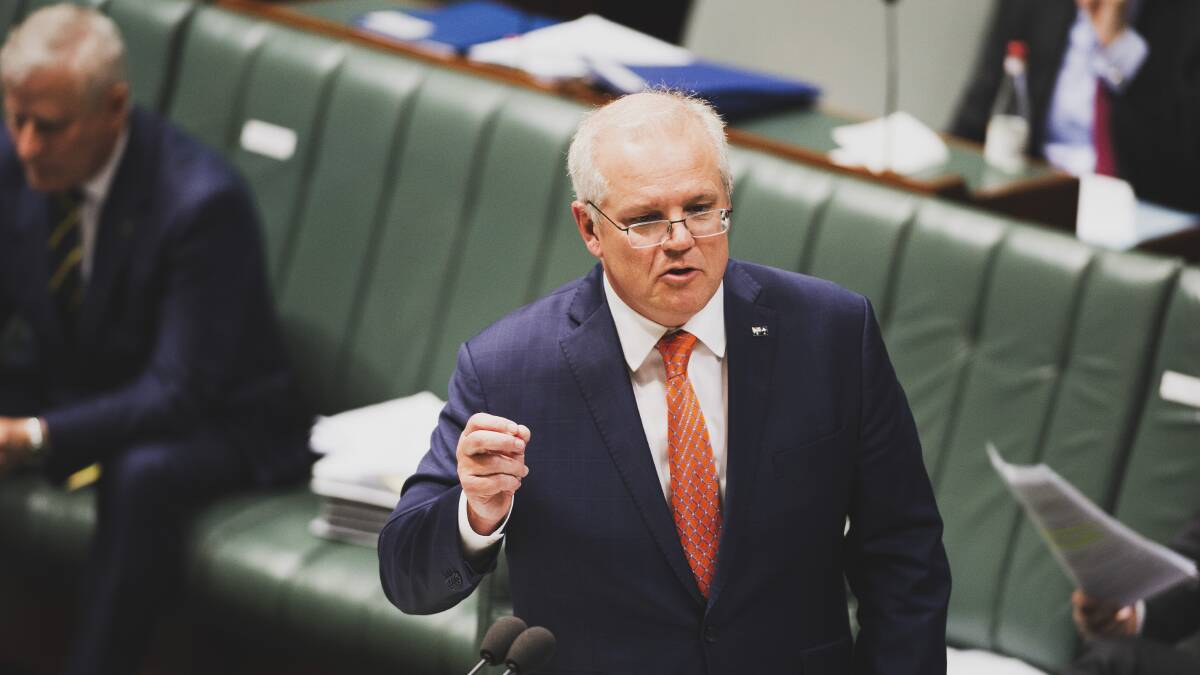As COVID year III approached on December 29, Scott Morrison sought to calm fears of the Omicron mutation of the pandemic. We will cope, he said, because we are Australians living in Australia.
Subscribe now for unlimited access.
$0/
(min cost $0)
or signup to continue reading
Morrison's apparent complacency recalled the scene in the movie Pleasantville where the mayor of that bland middle American town reassured his friends that they would survive a violent storm because they were sheltering in a bowling alley.
The Pleasantville scene was well-written and witty, claims which could be made of few statements expressed by the Prime Minister, or his struggling shadow. Facing the news cameras, Opposition Leader Anthony Albanese often strains to ensure that his words emerge in grammatical order and without deviating from a carefully vague script.
Seeking advantage from another December 29 Morrison cliché - about engaging a "new gear" in the government's pandemic response - Albanese laboured to simply retort that Morrison had "stalled the car", failing to properly resource vaccine supply.
Why are prime ministers and aspirants to the top job so often reduced to verbal mediocrity? Is it a problem with the individual, or the position? Is the prime ministership an "impossible office", generating fearful candidates and cringing incumbents too timid to risk the mildest reforms? Questions that resonate as the 2022 federal election looms.
Historian Anthony Seldon addressed that conundrum in his study of 300 years of the British prime ministership. Written in 2020, The Impossible Office explored a tradition-bound role consumed by the demands of Brexit and pandemic in an age of social media and the 24-hour news cycle. Seldon argued that "agile incumbents throughout the 300 years have negotiated their way round the difficulties ... turned them to their advantage, and come out on top".

A conclusion that seems optimistic when applied to contemporary Australian politics. Concepts of nimble political ascendancy and Scott Morrison sit awkwardly in the same sentence. Albanese's stressful encounters with language hardly seem agile.
Morrison wears his mediocrity as a badge of honour. Australians, Morrison claims, like to be governed by a boisterous, footy-loving bloke. His blokey simulacra Albanese displays the logos and colours of his preferred footy team from various points around his person like the badges of a desperate religious devotion.
Blokes are us? Really? Is that why in election after election Australians voted for Robert Menzies? Or later chose plummy Malcolm Fraser? Or for that matter, John Curtin and Gough Whitlam? Both Labor leaders were hardly knockabout blokes. Perhaps an impression of competence or vision proved compelling.
In Parliament and press conference Morrison furiously churns word fog to obscure a lack of policy content. Unsurprising, given that the most serious problems facing the nation are intractable, if not impossible. Morrison exhibits little enthusiasm for confronting climate change or addressing housing affordability.
Lacking coherent purpose, Morrison is reduced to being seen with as many Australians as possible. Australians seem to be Scott Morrison's favourite prop, evident in a stream of workplace photo ops where he hovers hi-vis grinning over the shoulder of conscripted extras in overalls.
Morrison is not the first to seek distraction from the demands of the 21st century prime ministership. Kevin Rudd seemed to prefer multiple photo ops in hospitals to the fraught task of formulating a coherent health policy.
Not since John Howard has any incumbent mastered the task of the prime ministership. Julia Gillard proved an effective reformer, managing key reforms like the NDIS through Parliament, yet she struggled to articulate a clear political message. Gillard's opponents and gross vilifiers did that for her.
Anthony Seldon observed that the prime ministership may at times seem to be impossible, "but it is only because of the way incumbents have chosen to act in office; not because of any inherent unworkability of their office". Dwell on that thought when next confronted with footage of Scott Morrison sitting in the cabin of a stationary truck honking the horn.
Yet Morrison calculates that he retains one advantage: he is not Anthony Albanese. Morrison delights in reminding Australians that if they vote Labor, then Albanese will become prime minister.
That Morrison will surely repeat this attack line between now and the next election demonstrates the enduring power of the prime ministership, wielded as a ruthless test of leadership.
- Dr Mark Hearn is a senior lecturer in the Department of History and Archaeology at Macquarie University.

